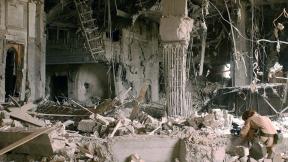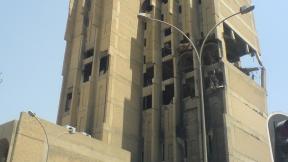
"I stopped praying for the US not to bomb us. I stopped praying for the sanctions to end. Now at night I pray that if I am going to die, that my son dies and that if I am going to live that my son lives because I don't want there to be a world where the two of us aren't together and I don't want him to be left behind without a mother."
These are the words of May, an Iraqi woman who is a PhD. Student in English literature at the University of Baghdad, as she awaits the impending US war on Iraq.
According to Bitta Mostofi, who met with May in January, this resignation to the strong possibility of war in the coming days is common to many women in the country.
Mostofi is co-coordinator of the group Voices In The Wilderness, a joint US/UK campaign to end economic sanctions against the people of Iraq. She was part of the Iraq Peace Team, a delegation organized by VITW that visited some of the country's schools, hospitals and people early this year.
With a US war on Iraq imminent, the United Nations has noted that the potential impact on women and children will be devastating. This group has been the most severely affected by past bombing campaigns on the country, economic sanctions, and the 1991 Gulf War.
"Once the bombing starts, even just getting their rations that they live on, that's not going to be getting to them," notes Amy Holcombe Mooney, another CO-coordinator of VITW. "They will not only have to worry about surviving the bombs, but also about how will they get by," she says.
"All businesses will definitely be shut down," Mooney adds. "If they were getting any income from selling what they made, that's out. If their husbands are cab drivers, no one will be driving on the streets. If they depend on a son who goes out to shine the shoes of diplomats or UN officials, all those people will be gone. Their livelihood will be threatened."
Amal, an Iraqi woman Mostofi met in Baghdad, illustrates this possible outcome.
An English teacher and mother of three, she has been teaching by day and painting by night. A teacher's salary in Baghdad is $5.00 (US) a month. Amal would stay awake to complete her oil and canvas paintings of women in traditional Iraqi society to supplement her income. But once the US strikes, with Baghdad being amongst the top targets as Iraq's capital city, it's unlikely anyone will be willing to come out to buy her paintings.
"When I asked her what she would do if the war occurred, she said, 'I'm saving all this money that I get from my paintings so that I can take my family and my children out of Baghdad into the one of the borders," Mostofi says.
Many Iraqis are already fleeing to Jordan, Syria, or other Iraqi borders, thinking that they'll be safer away from the main cities, where bombardment is more likely to occur.
The health effects of war on women include not only anemia during pregnancy, but also an increase in cancer and infertility.
In the southern regions of Iraq, there has been a five fold increase in cancer since the 1991 Gulf War, largely due to the presence of radioactive depleted uranium that had been used in missiles. There was never any proper cleanup conducted of these areas. However, there are communities living nearby.
"Within one family, you'll find a couple of types of cancer," notes Mostofi. "That's not a common thing that happens over 12 years."
About 1 million pregnant and lactating women will not have primary health care available to them should war occur, she adds.
But the harrowing health statistics don't factor in the psychological and emotional difficulties of just trying to survive in Iraq. Women, notes Mostofi, have dealt with the fallout with strength and perseverance.
"They have been the ones to maintain some sort of life for themselves and their children," she says. "They fight for a respectable existence for their families."
In almost every single family she visited, Mostofi says, women were heads of the household, even in the presence of men. She says the Gulf War, sanctions and perpetual bombings have been difficult for the men to deal with. The women, on the other hand, react to the situation differently.
"The women will do anything in their power to protect and care for their children and not allow themselves to fall apart in that process. It's so amazing," she says.
Mostofi recounts the case of Um Heydar, a teacher in Basra, whose son was killed and the other one injured after US forces bombed her home. Her surviving son has a piece of shrapnel in his back.
"Her husband is suffering from severe depression," she says "He's lost his job. He's basically of little use to maintaining a family structure and providing a life. His wife (Um Heyder) not only works and provides for the family, but takes care of the kids. The husband's sister lives with them too, and this woman helps provide for her as well. And this is a woman who has lost a son in a bombing and the other son has been maimed."
Iraqi women have decided to take a realistic stand towards the impending violence that will possibly claim the lives of themselves and their children. Mostofi says that whenever Um Heyder hears an air raid siren go off before an American or British bombardment in one of Iraq's no fly zones (which have been occurring at a rate of three per day since 1998, according to Mooney), she rushes home to be with her children, so they are all together should any one of them die at that moment.
"I just drop everything and run home to be with my kids," she told Mostofi. "I don't know when will be the final (moment), but I don't want to not be with them. No matter what I am doing or where I am, I want to be with my kids."
Despite the suffering, Mostofi says that Um Heyder makes it very clear all Americans are not to blame.
"She has defended the American people to just about everyone she talks to," Mostofi says. "She has drawn the distinction between the American people and the government. "
Iraqi women's strength in the face of the grim possibility of war is not any different from how most American women would and are reacting though.
"Women in Iraq and the strife they have had and how they reacted is similar to how women in this country would react," notes Mostofi. "There are many women that might lose their sons or husbands in war and they will cope with it as best as they can and maintain the structure of their families."
"The mothers of American soldiers fear for the lives of their kids going to war and many don't want them to be there (Iraq) or see a purpose for them to be there," says Mooney.
She adds that the billions of dollars being spent on war are also upsetting many American women.
"Many domestic programs in the country are being cut as far as grants to non-profits and the education sector because it's being used to fight this war, " she says. "At many demonstrations against the war, I've seen women holding signs that say 'Money for jobs not war', 'Bread not bombs'. I think many in the US understand the direct connection between what people here will lose if the country goes to war. "
"Women are definitely coming out in solidarity with Iraqis," says Mostofi. She cited examples like the campaign Code Pink, which has called on women in the US and the world to oppose war on Iraq. The National Organization for Women (NOW), the country's largest women's organization, is opposing the war on Iraq and has led full support to the Code Pink campaign.
"Women in this country should advocate for the government getting its paws out of the rest of the world and provide people with decent education and housing," says Mostofi.
Mooney suggests that women in America need to "continue what they've already been doing" to oppose the war in Iraq. That includes talking to friends and neighbors, organizing events, hosting speakers at schools, teaching about women who have been involved in the peace movement and nonviolent civil disobedience like Rosa Parks and VITW cofounder Kathy Kelly, as well as offering encouragement to younger women through their example.
She also says women must continue to stress the human face of the tragedy that lays buried beneath statistics and war talk.
Photo Attribution: http://commons.wikimedia.org/wiki/File:Iraqi_women_chant_campaign_slogans_-_Flickr_-_Al_Jazeera_English.jpg








Comments
If US changes regime in Iraq then next leader will definitely be a US puppet. Then his objective will obviously be to please US, rather than serving Iraqi people. As we have seen same drama in Afghanistan. Before the war media was doing propaganda about miserable lives of Afghani people due to Talaban. Now after the war, is there any change in life of Afghan people?, same misery, law and order is even worse, heroin cultivation has resumed.Main motive of war against Iraq is OIL. If US and UK have any sympathy with Iraqi people then they would not have forced UN resolutions against Iraq for 12 years which cause death of millions of people, especially children. Why not at the time of Gulf war, regime was changed by force? Why not there is same willingness and pressure against Israel for violating several UN and Security resolutions.
Location
The brother who gave the comment that this is an article advocating war must have been reading a different article to me! I believe that Saddam is not a very good man but when the head of the household goes nuts and threatens the safety of his family and neighbours it is not right to shoot everyone in around that person!!!!!this article shows the reckless behaviour of the west! it shows that the gulf war didn't work and niether will this unless they go after Saddam not Iraq.
Location
The article made the strongest possible case for military action against this oppressive regiem. No one in their right minds blames the police or the neighbor when the head of family behaves recklessly toward his own family and puts at risk neighbors with same reckless behavior. The authority that the Quran gives and requires of responsible leaders to tie the hands of repressive regiems is clearly evident in the life of Prophet Mohammed (PBUH). Our responsibility as Muslim citizens is to establish the clear criterion to be used in the "just war" or oppressive leaders will continue to divide us by tugging at our emotions. There is no calamity visited upon man that Allah does not know the outcome. The humanitarian concerns that integrated into military operations are as close to those instituted by the Prophet that I have seen in a modern Army. I hope these comments will encourage a more balanced dialogue among Muslims. Larry El-Amin, CW2, USA
Location
Add new comment